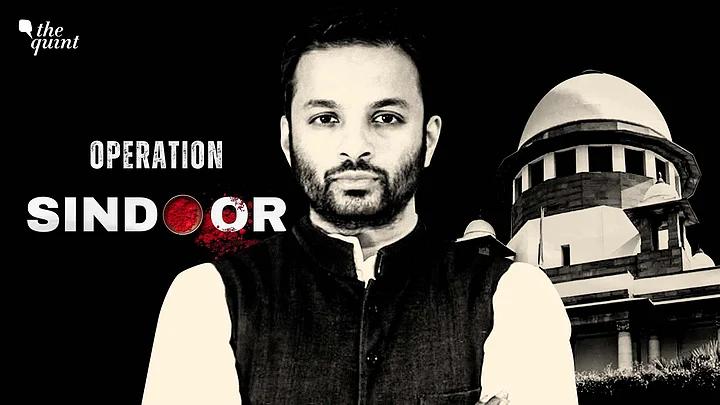In today’s digital age, freedom of speech often finds itself trapped between the slippery slopes of public sentiment and the ever-expanding definition of what "offends" people. What should ideally be protected as free expression is increasingly being policed, sometimes leading to disproportionate legal actions and arrests. The recent case involving Ali Mahmudabad, professor at Ashoka University, is a prime example where a social media post led to his arrest, a Supreme Court-mandated Special Investigation Team (SIT), and an investigation that seems to have lost its way.
As we know, two First Information Report(s) (FIRs) were registered against Mahmudabad and he was arrested on 18 May, pursuant to the said FIR. He was in jail for three days over a social media post following Operation Sindoor. On 21 May, he was granted interim bail by the apex court but strangely, the Court formed an SIT to investigate the social media post.
On 16 July, while hearing Mahmudabad’s petition titled “Mohammad Amir Ahmad @ Ali Khan Mahmudabad Vs State of Haryana”, the SC pulled up the SIT for expanding its scope beyond the mandated inquiry.
'You Need a Dictionary'
The bench of Justices Surya Kant and Joymalya Bagchi questioned why the SIT had seized Mahmudabad’s electronic devices when its role was only to examine the two social media posts in question. The Court noted that Mahmudabad had fully cooperated with the investigations, surrendered his devices, and should not be summoned again. In a sharp remark, Justice Kant quipped, "You don't require him (Mahmudabad), you require a dictionary."
The Court also warned that it may summon the SIT officers to explain why they confiscated Mahmudabad’s devices
It reiterated that the investigation must strictly adhere to the 28 May order—limiting the probe to the contents of the two posts, not an open-ended inquiry. The bench directed the SIT to conclude its investigation within four weeks. The order, dated 16 May 2025, reads:
"Though it may not be expedient or desirable for us to comment on the manner in which the SIT has directed itself to proceed, we, however, deem it appropriate to remind the mandate contained in para two of our order dated 28 May 2025, and consequently direct the SIT to conclude its investigation with reference to the contents of the two social medial posts, as early as possible, but not later than four weeks.”
In May, while granting him interim-bail, the Court as a condition to the bail had restrained Mahmudabad from writing any posts or articles in relation to the social media posts which are subject matter of the ongoing case.
Hence, on 16 July, the Court also clarified that Mahmudabad’s interim bail conditions only barred him from commenting on sub-judice matters, not from expressing opinions on other topics.
Even earlier in May, the Court specifically asked the authorities concerned to limit the scope of the SIT and told them not to try and expand the scope of the investigation.
Mahmudabad’s advocate, Kapil Sibal, informed the Court that the authorities are seeking access to Mahmudabad's digital devices. The Court remarked that the FIRs were already part of the record and told the AAG of Haryana:
"Both FIRs are matter of record. Where is the question of [his] devices? Don't try to expand the scope. SIT is free to form opinion. Don't go left and right"
An Inane Ordeal
The Mahmudabad episode raises serious concerns in a democracy. Was an SIT really necessary to investigate a social media post? A simple inquiry by a lower-level team could have sufficed, saving judicial and investigative resources.
The fact that a professor was arrested and jailed for three days over an opinion, shared digitally through a post, highlights how discussion and dissent are increasingly being criminalised in today’s climate.
As of today, Mahmudabad is facing offences under Section 196, 152, among others, of the Bharatiya Nyaya Sanhita, 2023 inter-alia, pertaining to acts prejudicial to maintaining communal harmony, making assertions likely to cause disharmony, acts endangering national sovereignty and words or gestures intended to insult a woman's modesty. He was also summoned by the Haryana State Commission for Women which is headed by Renu Bhatia.
Instead of engaging in debate, people are now quick to file criminal complaints against those they disagree with. The trend is specially visible when the said "perpetrators" belong to any social minority. This trend is dangerous—it chills free speech and discourages intellectual discourse. Tolerance and the right to dissent must be protected, especially in a democracy where freedom of expression is a cornerstone. As Dr BR Ambedkar once said:
"If we wish to maintain democracy not merely in form, but also in fact, what must we do? The first thing in my judgment we must do is to hold fast to constitutional methods of achieving our social and economic objectives... It means we must abandon the methods of civil disobedience, non-cooperation and satyagraha... when there was no way left for Constitutional methods for achieving economic and social objectives, there was a great deal of justification for unconstitutional methods. But where constitutional methods are open, there can be no justification for these unconstitutional methods."
In this case, the Constitutional method should have been dialogue, not arrest. The Supreme Court’s intervention is a reminder that free speech cannot be sacrificed at the altar of perceived offense. Let us hope now that the SIT heeds the Court’s warning, and such overreach does not become the norm. Let us hope they prefer dictionaries over censorship.
(Areeb Uddin Ahmed is an advocate practising at the Allahabad High Court. He writes on various legal developments. This is an opinion piece and the views expressed above are the author’s own. The Quint neither endorses nor is responsible for them.)
